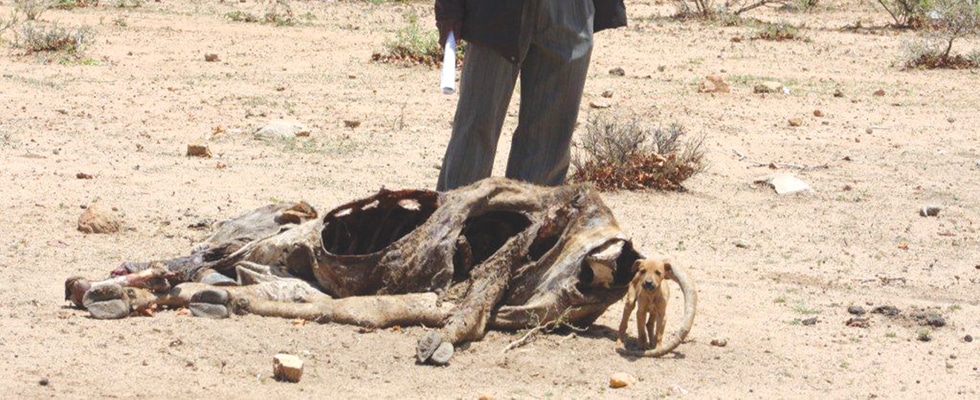
FARMERS in drought-prone Matabeleland South continue to watch helplessly as their prime investment – livestock – is slowly decimated by successive droughts.
Report by Nqobile Bhebhe Senior Reporter
The region has been hit by another cycle of acute shortage of pastures and water.
The lack of pastures has been blamed on the raging drought due to poor rains recorded in the last rainy season.
Districts in Matabeleland South which have been worst affected are Gwanda, Kezi, Mangwe and Bulilima.
“We witnessed a heartbreaking, systematic decimation of our decades of investment as we watched haplessly our cattle dying,” says Councillor Alexander Phiri of Makasa ward in Matopo South.
Matabeleland South is traditionally the backbone of the country’s cattle herd, but consecutive droughts have drastically reduced the herd to alarming levels, putting a strain on villagers.
Phiri says the tipping point was reached six months ago as they watched in shock hundreds of cattle, their main source of livelihood and wealth, dying on a daily basis.
- Chamisa under fire over US$120K donation
- Mavhunga puts DeMbare into Chibuku quarterfinals
- Pension funds bet on Cabora Bassa oilfields
- Councils defy govt fire tender directive
Keep Reading
As cattle were dying, many gave up any hope of relief, either from government or traditional sources – the non-governmental organisations – coming by.
“On a daily basis, I would get reports that at such a homestead about three or four cattle have succumbed to drought,” said Phiri. “It was heartbreaking.”
On Monday, our news crew spotted several fresh carcasses.
Phiri said livestock were being moved distances of between 10 and 15km to areas where pasture was still available and water points as many water sources had dried up. Villagers were also put under strain from ‘flight by night cattle traders’ who pestered them to give away their remaining herd at below market rates.
“Those were difficult periods for villagers,” said Phiri. “Smartly dressed men would come in flashy car promising us instant cash for our livestock. Most villagers succumbed to that pressure and eventually sold for as little as $90 each yet the true value is around $500 for healthy beasts.”
Other villagers opted to trade their cattle for solar panels and motorcycles for fear of losing out.
Villagers also complained that some unscrupulous farm owners were cashing in on the drought situation by demanding a beast for every 10 cattle in exchange for pastures.
Some farm owners have in the past been fighting running battles with villagers over cattle that stray into their farms in search of pastures. However, during his interaction with stakeholders in Bulawayo last week during a 2013 National Budget consultative meeting, Finance minister Tendai Biti said government has allocated $10 million to the drought-stricken province in a bid to avert more livestock death.
The Exchequer said the funds were for procurement of stock feed, drilling of boreholes and restocking. To date $3 million has been disbursed, he said. According to statistics from the Department of Livestock Production and Development (DLPD), the country has an estimated population of 5,2 million cattle of which 398 200 are in Matabeleland South, meaning that the province contributes about 7, 8 percent to the national herd.
Early in October some form of relief stockfeed started trickling in but at a cost to villagers who are struggling with cash.
A 50 kilogramme of stockfeed is sold at veterinary stations for $11, an amount villagers say is too high under the circumstances.
Alois Ncube, a villager in Maphisa, said although the stockfeed came a bit late, it would save the remaining livestock.
Provincial governor Angeline Masuku says stock feed distribution programme had seen over 1 000 bales of grass delivered to Gwanda and Beitbridge districts.
She said a bale was being sold for $2 and stockfeed $11 per kilogramme. Farmers in Mangwe district have teamed up and formed community livestock feedlots in a project designed to be the blueprint for survival of livestock in the drought-prone province.
Agriculture, Mechanisation and Irrigation Development deputy minister Seiso Moyo said although the stockfeed could be viewed as being late, from the government side it was timely.
“We are aware that farmers have been saying the intervention from government has been late, but we are of the opinion that it was timely in the sense that it is at this period that cattle tend to die more,” he said.
Moyo said the programme wasset to run throughout the rainy season till pastures levels picked up.











